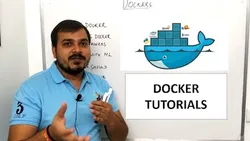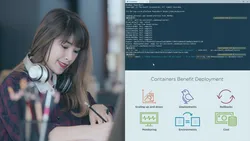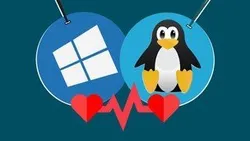
Docker End to End Implementation 
This course provides an end-to-end implementation of Docker, covering topics such as why and what Docker is, Docker containers, virtualization in machine learning, building a Flask app for bank note authentication, and deploying machine learning models using Flask and FastAPI. Participants will gain a comprehensive understanding of Docker and its applications in machine learning. ▼
ADVERTISEMENT
Course Feature
![]() Cost:
Cost:
Free
![]() Provider:
Provider:
Youtube
![]() Certificate:
Certificate:
Paid Certification
![]() Language:
Language:
English
![]() Start Date:
Start Date:
On-Demand
Course Overview
❗The content presented here is sourced directly from Youtube platform. For comprehensive course details, including enrollment information, simply click on the 'Go to class' link on our website.
Updated in [February 21st, 2023]
Learners can learn from Docker End to End Implementation in a variety of ways. Firstly, they can gain an understanding of why and what Docker is, as well as how it works with virtualization in machine learning. Secondly, they can learn how to build a Flask app for bank note authentication, and how to deploy machine learning models using Flask and Flasgger. Thirdly, they can learn how to install Docker in Windows and other operating systems, as well as how to use Docker commands. Fourthly, they can learn how to write, build, and run Docker images. Finally, they can learn how to deploy machine learning models using StreamLit library and how to deploy machine learning pipelines using Dockers and Kubernetes.
[Applications]
After completing this course, participants should be able to apply the knowledge gained to create and deploy Docker containers for their own applications. They should be able to use Docker commands to build, run, and manage Docker images. Additionally, they should be able to use StreamLit and Flasgger to deploy Machine Learning models and pipelines using Dockers and Kubernetes.
[Career Paths]
1. DevOps Engineer: DevOps Engineers are responsible for managing the development, testing, and deployment of applications and services. They are responsible for automating processes, setting up and maintaining infrastructure, and ensuring that applications are running smoothly. They must be knowledgeable in both software development and system administration. As the demand for DevOps Engineers continues to grow, they must stay up to date with the latest technologies and trends in the industry.
2. Cloud Engineer: Cloud Engineers are responsible for designing, building, and maintaining cloud-based systems. They must be knowledgeable in cloud computing technologies, such as Docker, Kubernetes, and AWS. They must also be able to troubleshoot and optimize cloud-based systems. As cloud computing continues to grow in popularity, Cloud Engineers must stay up to date with the latest technologies and trends in the industry.
3. Data Scientist: Data Scientists are responsible for analyzing large amounts of data and extracting insights from it. They must be knowledgeable in data analysis, machine learning, and statistics. As the demand for data-driven insights continues to grow, Data Scientists must stay up to date with the latest technologies and trends in the industry.
4. Machine Learning Engineer: Machine Learning Engineers are responsible for developing and deploying machine learning models. They must be knowledgeable in machine learning algorithms, software engineering, and data engineering. As the demand for machine learning applications continues to grow, Machine Learning Engineers must stay up to date with the latest technologies and trends in the industry.
Course Provider

Provider Youtube's Stats at AZClass
Discussion and Reviews
0.0 (Based on 0 reviews)
Explore Similar Online Courses

Effective Time Management: Prioritize Tasks and Boost Productivity

Health and wellbeing in the ancient world

Python for Informatics: Exploring Information

Social Network Analysis

Introduction to Systematic Review and Meta-Analysis

The Analytics Edge

DCO042 - Python For Informatics

Causal Diagrams: Draw Your Assumptions Before Your Conclusions

Whole genome sequencing of bacterial genomes - tools and applications

Managing Docker on Linux Servers

Fundamentals of Docker and Kubernetes for NET Developers


Start your review of Docker End to End Implementation